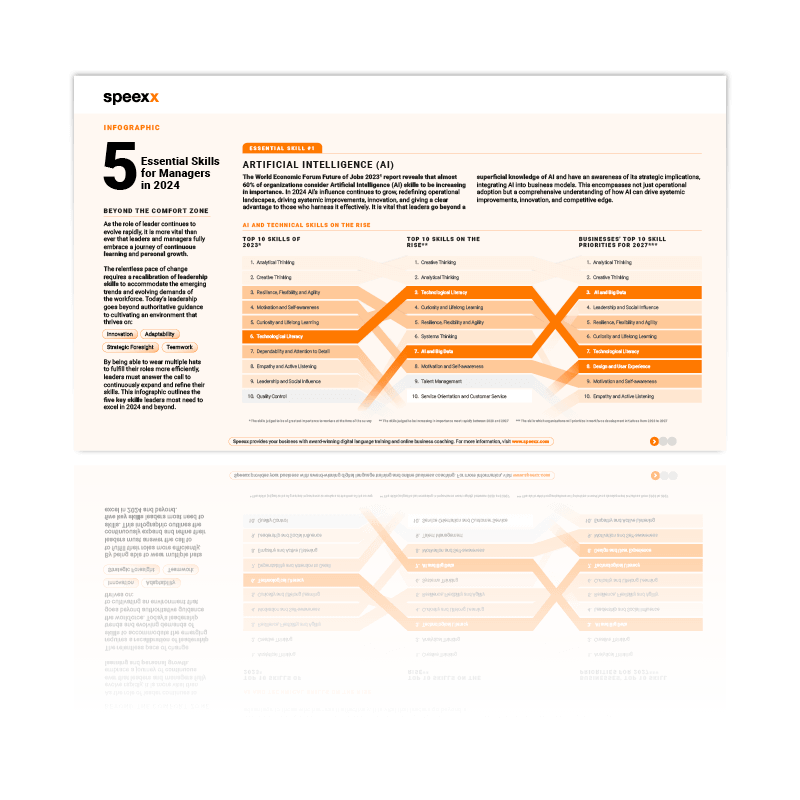The extent to which a business is able to thrive and grow depends largely on how effective its leadership is. But what exactly does effective leadership look like? For years, experts have explored this question, analyzing the personality traits and behaviors of the most successful business leaders. Daniel Goleman, the psychologist who popularized the concept of emotional intelligence, asserts in his article “Leadership that Gets Results” that the most effective leaders adapt their behavior to each unique situation. He suggests that certain emotional skills, which can be developed in leadership programs, are crucial. This article will examine the benefits of such programs, identify the emotional skills we need to cultivate, and explore how we can apply what is taught in these programs at work.
Why Embark on a Leadership Program?
It’s crucial to actively develop leadership skills that will help you excel in daily operations, especially if you are leading a team for the first time. For many, this process is a personal transformation, as the skills required for leadership roles are closely tied to emotional intelligence.
In a leadership program, you will acquire a set of skills and techniques that equip you to effectively lead a team and adapt your behavior to new situations. For instance, you will learn how to manage disputes and tensions between team members, implement organizational changes that may cause anxiety among employees, foster and manage a diverse and inclusive team, and ensure clear and effective communication at all levels of the organization, particularly during times of crisis or change. Successfully navigating these challenges requires a high degree of emotional intelligence, problem-solving skills, and the ability to adapt to various leadership styles based on the situation.
Such programs offer significant benefits to both individuals and the organization as a whole. Strong and mindful leadership enhances employee satisfaction, which reduces churn, improves retention, and minimizes the financial burdens associated with hiring new staff. The well-being of the workforce largely depends on the effectiveness of the company’s leadership development strategy.

What are the leadership skills you need most today? Find out in this infographic!
Key Competencies of Leadership Programs
According to Daniel Goleman, the most effective leaders do not confine themselves to a single leadership style but instead master several, seamlessly transitioning from one style to another as situations demand. The ability to know when and how to employ these diverse styles is crucial. Emotional intelligence is integral to leadership development. Below are five key emotional intelligence competencies that are essential for developing robust leadership skills:
Self-awareness: This is the ability to accurately perceive your own strengths, limitations, emotions, values, and motivations. While it may seem simple to develop, this skill significantly enhances self-confidence and is deeply rooted in history; as Socrates famously said in the 5th century BC, “Know thyself.”
Self-regulation: This involves managing and controlling your own emotions, behaviors, and impulses. Successful self-regulation relies heavily on self-knowledge and self-awareness, as recognizing your emotional triggers allows you to respond appropriately.
Motivation: Understanding what truly drives us is crucial yet often neglected. Many people operate on autopilot, seldom pausing to ponder what genuinely motivates them. A leader who understands and harnesses their motivations is able to inspire and instill confidence in their team.
Empathy: The ability to comprehend and empathize with others’ feelings and experiences is not only vital for leaders but also impacts the overall workplace atmosphere significantly.
Social skills: Developing a keen sense of one’s own emotions facilitates the recognition of emotions in others, which is crucial for forging strong, collaborative relationships aligned with shared visions and goals.

This infographic explores how to harness the power of internal comms.
Applying What You Have Learned in Leadership Programs
Once you have completed the leadership program, the most important stage of the learning process is to retain the knowledge and apply it in your daily life. Behavior is not something that changes overnight. Knowing what to do, for example, when you have to give constructive feedback to a team member who has made a mistake, when you are faced with performance appraisals, or when you have to choose between two very similar candidates, is crucial. The real challenge of the process is to internalize the new competencies in order to apply them when a difficult situation arises.
Business Coaching is a great ally to achieve a sustainable learning curve over time and to ensure that the learning curve does not decline shortly after the Leadership program. With a plan of one or two hours a week for 6 to 12 months, you can work with your Coach on the real situations you face every day. Your Coach will guide you in making your own decisions, allowing you to draw your own conclusions and develop your career. The aim of having this kind of guidance is to learn how to manage these situations in the future without help.

Leadership Programs with Business Coaching Support
Leadership programs are an essential tool for anyone aspiring to lead successfully. By focusing on the development of key competencies such as self-awareness, self-regulation, motivation, empathy, and social skills, these programs benefit not only the individual but also the company as a whole. Effective and adaptive leadership, as proposed by Daniel Goleman, has the potential to significantly improve the well-being and productivity of the team. Moreover, the constant application of what is learned, supported by Business Coaching, ensures a sustainable learning curve and a continuous evolution of leadership skills. Ultimately, investing in Leadership programs is a strategic decision that can transform both leaders and their organizations, promoting a more positive and effective work environment.
